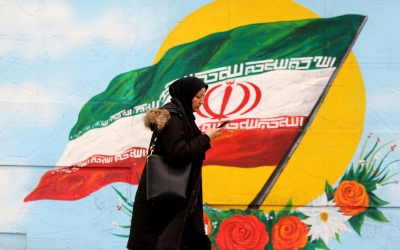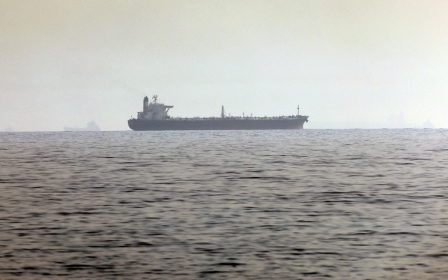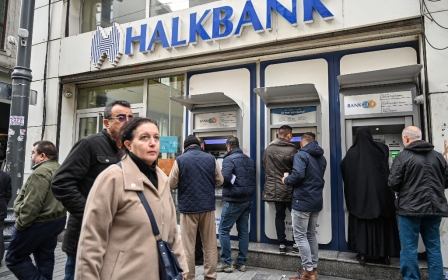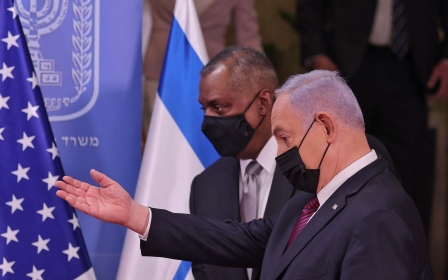Natanz: Will nuclear plant attack derail Iran deal diplomacy?
After the first round of indirect nuclear deal talks between the United States and Iran in Vienna last week, officials expressed cautious optimism.
But only days later, a covert attack on an Iranian nuclear facility fuelled tensions and uncertainty ahead of a second round of negotiations in the Austrian capital.
Despite the recent escalation, experts say, diplomatic efforts to restore the nuclear deal will proceed - as evidenced by the fact that American and Iranian representatives are showing up to resume the Vienna talks.
"The Iranians have been here before. They have experienced similar types of pressures from Israel. That didn't stop diplomacy then, and it won't stop diplomacy now," said Alex Vatanka, director of the Iran program and a senior fellow at the Middle East Institute.
Last week, the US State Department called the talks a "welcome step"; a Russian diplomat described them as "successful"; and a European official said the meeting was "constructive".
New MEE newsletter: Jerusalem Dispatch
Sign up to get the latest insights and analysis on Israel-Palestine, alongside Turkey Unpacked and other MEE newsletters
On Sunday, the attack, whose nature remains unclear, caused a power outage at the Natanz nuclear plant. Iran blamed the incident on Israel and vowed revenge.
"Reckless criminal nuclear terrorism," Iranian Foreign Minister Mohammad Javad Zarif called the sabotage. And on Tuesday, Iran announced increasing its uranium enrichment level to 60 percent in a further breach of the nuclear agreement.
Was the US involved?
Israel and the United States have worked jointly on sabotage operations against Iran in the past, including the Stuxnet computer virus that damaged Iran's nuclear programme in 2010.
More than a decade later, Washington is unambiguously denying involvement in Sunday's attack at Natanz, while Israel is unofficially taking credit for it through statements from anonymous officials to American and Israeli media outlets.
Despite the official denial, Vantaka said it remains unclear whether the Biden administration had advanced knowledge of the attack.
"If the Israelis did this on their own and didn't let the United States know, then this was a message not just to Iran, but also a message to the United States and the Europeans that Israel will go its own way if it has to," Vatanka told MEE.
"But at the end of the day, if the question is whether US-Iran diplomatic talks will continue, the answer to that is: at this point, there's no evidence to suggest otherwise."
The Israeli government has previously said it will forge its own policy on Iran if Washington decides to return to the nuclear deal.
But if the goal is to halt Iran's nuclear programme, attacks like the sabotage at Natanz or the assassination of nuclear scientist Mohsen Kakhrizadeh earlier this year will not produce the desired effect, said Naysan Rafati, Iran senior analyst at the Crisis Group.
He added that these covert operations have not served as an effective alternative to talks to scale back Iran's nuclear programme without conceding on sanctions.
"When you look at Stuxnet; when you look at the killings of the nuclear scientists before the deal; when you look at the couple of operations that we've had in 2020; and you set that against what we know about Iran's nuclear programme, I think it's hard to say that they reverse Iran's developments," Rafati told MEE.
'It is a brazen act by Israel... to sabotage the prospects of diplomacy'
- Sina Toossi, NIAC
He noted that Iran has advanced its nuclear programme qualitatively and quantitatively despite these incidents, enriching uranium at a higher level and amassing a larger stockpile of nuclear material.
Sina Toossi, a senior research analyst at the National Iranian American Council (NIAC), echoed Rafati's comment. He said while the extent of the damage at Natanz is not clear, Iran has responded to similar attacks in the past by boosting the production of nuclear material.
"It is a brazen act by Israel, not only to sabotage Iran's nuclear programme, but to sabotage the prospects of diplomacy - to goad Iran into overreacting, to provoke Iran," Toossi told MEE.
"And I think ultimately, mostly it is going to result in Iran doubling down on its nuclear programme."
Israel and its de-facto Gulf Arab allies have been warning Washington against going back to the pact.
The multilateral 2015 nuclear deal, known as the Joint Comprehensive Plan of Action (JCPOA), saw Iran scale back its nuclear programme in exchange for lifting sanctions against its economy.
Former President Donald Trump nixed the agreement in 2018 and implemented a "maximum pressure" campaign of sanctions against Iran. In response, Tehran has been loosening its own commitments to the agreement.
Reviving JCPOA
The current administration of President Joe Biden says it is seeking a return to the deal, but Washington and Tehran have not been able to agree on a path forward to revive the accord.
In Vienna, Iran has been engaged in talks with the remaining signatories of the JCPOA - China, the UK, France, Germany and Russia, while an American delegation is meeting separately with European intermediaries.
Last week, the parties agreed to continue meetings at the expert level to identify steps that both the US and Iran must take to restore the deal.
But - at least publicly - Iranian officials keep insisting that Washington must verifiably lift all sanctions imposed by Trump first to get back into the JCPOA.
While talks are proceeding despite the nuclear facility incident on Sunday, restoring the agreement remains a complex process.
At this point, talks in Vienna are focused on working out ironing out lists of steps that each side is willing to take in terms of sanctions relief and nuclear activities.
The Trump administration had imposed several layers of sanctions on many Iranian entities, including non-nuclear sanctions relating to "terrorism" and human rights abuses.
"Even without the Natanz incident, even without the 60 percent [uranium enrichment], this is a very, very technical and granular series of discussions happening at the expert level," Rafati said.
Things do not get easier from there. The negotiators will then have to get a stamp of approval from their respective higher-ups in Washington and Tehran before having to agree on the sequencing and implementation of the steps leading back to the agreement, Rafati explained.
Even if the JCPOA is revived, Rafati added, skirmishes between Iran and Israel and attacks like the Natanz operation may persist - although neither side is interested in a potentially destructive all-out war.
On Tuesday, an Israeli-owned ship was attacked in the Gulf, and an explosion struck an Iranian ship in the Red Sea last week.
Vatanka, of the Middle East Institute, said Israeli intelligence operations in Iran may not single-handedly stop Tehran's nuclear programme but they are a source of anxiety for the Iranian government.
He described Israeli infiltration of sensitive Iranian sites as "effective and extensive".
"They're not just stopping Iran's nuclear programme in terms of the operational aspect, but they are raising all sorts of uncomfortable questions politically around how badly the place has been penetrated by the Israelis and likely other foreign intelligence services," Vatanka told MEE.
"And that will start creating not just high anxiety, but potentially serious infighting and a blame-game inside the Iranian regime."
Middle East Eye delivers independent and unrivalled coverage and analysis of the Middle East, North Africa and beyond. To learn more about republishing this content and the associated fees, please fill out this form. More about MEE can be found here.





